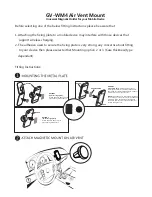
62
RF energy interference/compatibility
Nearly every electronic device is subject to RF energy interference from external sources if
inadequately shielded, designed or otherwise configured for RF energy compatibility. In
some circumstances, your mobile device may cause interference with other devices.
Follow instructions to avoid interference problems
Turn off your mobile device in any location where posted notices instruct you to do so.
In an aircraft, turn off your mobile device whenever instructed to do so by airline staff. If
your mobile device offers a flight mode or similar feature, consult airline staff about using
it in-flight.
Implantable medical devices
If you have an implantable medical device, such as a pacemaker or defibrillator, consult
your doctor before using this mobile device.
Persons with implantable medical devices should observe the following precautions:
•
ALWAYS keep the mobile device more than 20 centimetres (8 inches) from the
implantable medical device when the mobile device is turned ON.
•
DO NOT carry the mobile device in the breast pocket.
•
Use the ear opposite the implantable medical device to minimise the potential for
interference.
•
Turn OFF the mobile device immediately if you have any reason to suspect that
interference is taking place.
Read and follow the directions from the manufacturer of your implantable medical device.
If you have any questions about using your mobile device with your implantable medical
device, consult your health care provider.
Specific absorption rate (ICNIRP)
SAR (ICNIRP)
YOUR MOBILE DEVICE MEETS INTERNATIONAL
GUIDELINES FOR EXPOSURE TO RADIO WAVES.
Your mobile device is a radio transmitter and receiver. It is designed not to exceed the
limits for exposure to radio waves (radio frequency electromagnetic fields) recommended
by international guidelines. The guidelines were developed by an independent scientific
organisation (ICNIRP) and include a substantial safety margin designed to assure the
safety of all persons, regardless of age and health.
The radio wave exposure guidelines use a unit of measurement known as the Specific
absorption rate, or SAR. The SAR limit for mobile devices is 2 W/kg.
Tests for SAR are conducted using standard operating positions with the device
transmitting at its highest certified power level in all tested frequency bands. The highest
SAR values under the ICNIRP guidelines for your device model are listed below:
During use, the actual SAR values for your device are usually well below the values
stated. This is because, for purposes of system efficiency and to minimise interference on
the network, the operating power of your mobile device is automatically decreased when
full power is not needed for the call. The lower the power output of the device, the lower
its SAR value.
Body-worn SAR testing has been carried out using an approved accessory or at a
separation distance of 2.5 cm (1 inch). To meet RF exposure guidelines during body-worn
operation, the device should be in an approved accessory or positioned at least 2.5 cm
(1 inch) away from the body. If you are not using an approved accessory, ensure that
whatever product is used is free of any metal and that it positions the phone at least
2.5 cm (1 inch) away from the body.
The World Health Organisation has stated that present scientific information does not
indicate the need for any special precautions for the use of mobile devices. They
recommend that if you are interested in further reducing your exposure then you can easily
do so by limiting your usage or simply using a hands-free kit to keep the device away from
the head and body.
Additional information can be found at www.who.int/emf (World Health
Organisation) or www.motorola.com/rfhealth (Motorola Mobility, Inc.).
Information from the World Health
Organisation
WHO information
"A large number of studies have been performed over the last two decades to assess
whether mobile phones pose a potential health risk. To date, no adverse health effects
have been established for mobile phone use."
Source: WHO fact sheet 193
Further information: http://www.who.int/emf
Head SAR
UMTS 900 + WiFi + Bluetooth
1,09 W/kg
Body-worn SAR
UMTS 900 + WiFi + Bluetooth
0,58 W/kg












































